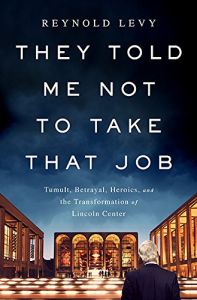Join getAbstract to access the summary!

Join getAbstract to access the summary!
Reynold Levy
They Told Me Not to Take That Job
Tumult, Betrayal, Heroics, and the Transformation of Lincoln Center
Public Affairs, 2015
What's inside?
Reynold Levy covers the backstage tactics, trials and dramas of leading Lincoln Center. Welcome to the Machiavellian politics of the nonprofit world.
Recommendation
Accomplished businessman, board member and Columbia University professor Reynold Levy ran New York City’s Lincoln Center for the Performing Arts for 12 years. Deeply vested in the nonprofit world and accustomed to its Machiavellian politics, Levy led Lincoln Center through a massive renovation and fund-raising drive. He dealt with every conceivable bureaucratic battle and flamboyant personality. Through it all, Levy remained pragmatic, dedicated and determined to leave Lincoln Center more financially secure, artistically daring and internationally famous than he found it. He stood at the epicenter of high culture in New York City and tells the stories that prove it. Levy spins amazing tales of vicious infighting and artistic heroism. His prose can be a bit dense, and he asks sequential rhetorical questions when you might long for simple statements of fact. Even so, you can’t get more inside the worlds of cultural, civic and financial power than this. getAbstract recommends Levy’s take-no-prisoners memoir to CEOs, managers of nonprofits, and fans of opera, ballet, symphony, jazz and film.
Summary
About the Author
Reynold Levy is an adjunct professor at Columbia University’s School of International and Public Affairs, a special adviser to a private equity firm, and a consultant to nonprofits.


















Comment on this summary